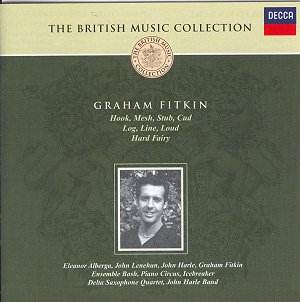In no respect can Decca’s ‘British Music Collection’
be said to be treading water. Certainly there has been Britten,
Walton and Delius but Decca also explore young composers. Graham
Fitkin is forty this year (2003) and already has behind him a
distinctive body of highly original work. His style is minimalist
but in an individual way. Recently his language has grown richer.
The pieces of these two discs are what I suspect
will one day be called ‘early works’. They date from the mid-1980s
to the mid-1990s. Represented here are pieces for large ensembles,
small ensembles and piano, either solo, or in twos, threes or
sixes. I regret the omission of the orchestral works named after
colours like ‘Green’. It cannot therefore be said that this selection
is totally representative of his output. Stylistically the menu
here affords a good guide. I suspect that, in the end, you will
either love this music or loathe it.
Well done to Decca for the idea of putting this
double album together. One thing I can say at the outset is that
the performances are superb. Any young composer with such committed
readings as these is very fortunate indeed and can say that he
has been every chance to be heard at his best. The recordings
too are excellent and perfectly balanced.
I realize that by reading this you are probably
one of the converted but for me listening to Fitkin is rather
like being in the outside lane of an urban motorway mostly exceeding
the speed limit and going round and round without ever taking
an exit route. It can often be exciting and exhilarating but also
irritating and sometimes even frightening. I don’t like the experience
although it does depend on the mood I’m in and the time of day.
Some pieces like the last work on CD2, the piano
duet ‘Fract’, is a non-stop drive which leaves one quite breathless.
Another piano piece, say ‘Fervent’, has moments of repose and
even lyrical beauty as the driver now and again slows down to
take in a particularly interesting view. Some of the shorter piano
pieces are quiet and reflective throughout, as is ‘Line’ for six
pianos. These pieces tend to be short and carry titles such as
‘Piano Piece early 93’. And really that’s it. Those are your three
emotional states. In most cases it seems to me that the moods
are repeated from one work to another so that they could be joined
up to make one long monster of a ride. The material is often simple
and similar. In some cases it is weak and unmemorable; only made
as memorable as possible by constantly being hammered at you until
you submit. It is a metaphor for contemporary urban life which
it sums up as well as Vaughan Williams could evoke the English
country landscape.
I must add however that sometimes, as in the
deliciously ambiguously titled ‘Hard Fairy’ for sax and piano,
the slower, reflective elements are held in balance with the manic
fast jazz music voices. That piece works very well. But in the
perpetuum mobile of ‘Stub’ for sax quartet the pace is
relentless. All becomes just an irritant like a buzzing wasp in
the bedroom.
In a sense, Fitkin hides behinds his emotions
when writing for one, two, three or six pianos, stressing mostly,
as he does, the percussive nature of the instrument. The slow
pieces are mostly chordal and in some cases, for example ‘Piano
piece 91’, casting a wave at Messiaen. ‘Blue’ nods to Copland.
You might think that moving into ensemble music
would tempt the composer to show more colour and sensuality. Not
so. Fitkin eschews sensuality particularly so with marimba quartet
or sax quartet. With ‘Mesh’ for the group ‘Icebreaker’ (consisting
of ten players, woodwind plus two guitars and three keyboards)
there is no sense of colouristic effects. Everything is subsumed
into the driving forces of rhythm and form. Yes, form is vital
and each piece is a sound-form in time. Each is sculpted, and
when the form has reached its apogee the work ends. There is no
conventional fuss or climax it stops existing.
The detailed, if somewhat microscopic booklet
notes by Laurence Crane have been written by someone who is much
less of a sceptic than I.
Gary Higginson
See also review
by Neil Horner
